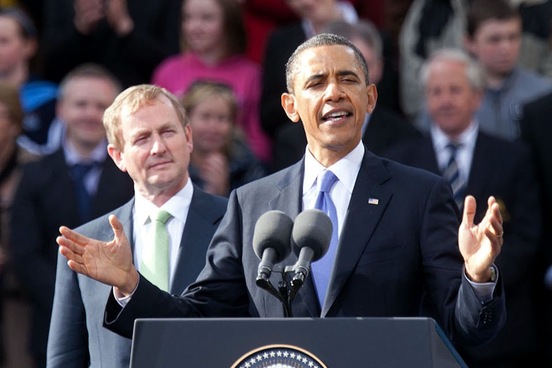“‘Enormity,’ to save you the trouble of looking it up, does not mean greatness size wise. It means ‘excessive wickedness.’ Such language suits the purposes of our new president, with the apparent consent of the American people. God help us.” — Ben Manring, letter in The Indianapolis Star, 8 Nov. 2008
About the Word:
In 2008 Barack Obama used the word enormity to mean "great size" a number of times in his speeches. The apparent misuse of this word appalled many people who hold sacrosanct the notion that enormity must only be used to describe things of great wickedness.
Of course, Obama was not the first person to use enormity to mean ‘largeness’; the reason it bothers people is that many people use it in this way. In fact, we have been using enormity to mean "enormousness" for almost 400 years now (Thomas Eliot used it this way back in 1532).
Definition:
: a shocking, evil, or immoral act
: great evil or wickedness
: great size
Donald Trump: “Who should I fire? Should I fire Maria?”
Cyndi Lauper: “I can’t…”
Donald Trump: “Why don’t you just say Maria?”
Cyndi Lauper: “Because I feel bad. She’s happy now…”
Donald Trump: “Badly. You feel badly.”
Cyndi Lauper: “Badly.”
— Donald Trump & Cyndi Lauper, The Apprentice (television show), season 9, episode 7
About the Word:
Donald Trump is hardly the first person (or even the first politician) to have difficulty in telling the difference between when one should use bad and badly in describing how one feels. He is, however, probably the first presidential candidate who has made the regrettable decision to correct someone who was actually using the correct form, and while on national television.
In the 9th season of the show, Trump took the opportunity to ‘correct’ Cyndi Lauper’s use of bad (when describing how she felt) to badly. However, it is entirely correct to say ‘I feel bad.’ The reason that Trump fell victim to this common hypercorrection is that feel is a verb, and many people learned that the word following a verb should be an adverb (badly), rather than an adjective (bad).
But feel belongs to a class of words referred to as linking (or 'copulative') verbs, which can be followed by an adjective. This is why James Brown sang ‘I feel good,’ rather than ‘I feel well,’ or ‘I feel goodly.’
Definition:
: in a bad manner
: to a great or intense degree
“Iron is galvanized, rubber vulcanized, corn hybridized, salt iodized, people hypnotized. But we agonized when President Kennedy utilized and Merriam-Webster dictionary authorized the word finalized.” — The New York Herald Tribune, 26 Dec. 1961
About the Word:
More than one of our presidents have felt the sting of public opprobrium for employing the dreaded word finalize in their speeches, but this particular opprobrium was born from a press conference in November of 1961, when President Kennedy responded to a reporter’s query by saying “We have not finalized any plans.” A measure of outrage ensued.
Before Kennedy committed this ostensibly grievous blunder, President Eisenhower had caught flak for the same word. The New York Times, in a 1961 article about Kennedy’s usage, quoted an unnamed ‘grieving linguist’ as saying “Eisenhower began the process, and Kennedy is finalizing it.”
A number of people had been guarding the English language against the intrusions of the word finalize for decades at this point, usually on the grounds that it was commonly used as business jargon. This position conveniently overlooks that the word had been in use since at least 1780.
Definition:
: to put in final or finished form : to give final approval to
“Belittle!—What an expression!—It may be an elegant one in Virginia, and even perhaps perfectly intelligible; but for our part, all we can do is, to guess at its meaning.—For shame, Mr. Jefferson!” — The London Review, August 1787
About the Word:
Thomas Jefferson was not yet president when he was scolded by a British reviewer for his coinage of the word belittle, but the reaction to this word was so overheated that it deserves a mention nonetheless. Jefferson had recently published his two-volume work Notes on the State of Virginia (it was released privately in the early 1780s, and published publicly in 1787), a book which contained the line “So far the Count de Buffon has carried this new theory of the tendency of nature to belittle her productions on this side of the Atlantic.”
An anonymous critic for the London Review seethed when he encountered this word. In addition to his splenetic jibe quoted above, he wrote “Freely, good sir, we will forgive you all your attacks, impotent as they are illiberal, upon our national character; but for the future, spare—O spare, we beseech you, our mother-tongue!”
Definition:
: to speak slightingly of; to disparage : to cause (a person or thing) to seem little or less
“Sometimes you misunderestimated me.” — George W. Bush, News Conference, 12 Jan. 2009
About the Word:
George W. Bush attracted considerable scorn for his lapses with the English language. Perhaps none has been commented on so much as his portmanteau misunderestimate. A blend of misunderstand and underestimate, the word was occasionally used by Bush throughout his two terms as President; it saw considerably more use by people who employed it as evidence of Bush’s lack of skill with language.
As with so many other words that supposedly originated with a specific person, misunderestimate had been bouncing around the English language for some time before Bush got around to using it. An article in The Philadelphia Inquirer from 1913 contains the line “Wall Street’s most powerful lenders were made to suffer for misunderestimating the European situation.” Numerous other examples can be found throughout the 20th century. These other uses notwithstanding, the word now seems destined to be forever linked with George W. Bush.
Definition:
apparently to both misunderstand and underestimate
“I have looked for ‘normality’ in my dictionary, and I do not find it there. ‘Normalcy,’ however, I did find, and it is a good word.” — Warren G. Harding, quoted in The New York Times, 21 July 1920
About the Word:
In the presidential election of 1920 Warren G. Harding (or someone working for him) came up with what must have seemed like a fine campaign slogan, a ‘return to normalcy.’ However, the word was unfamiliar to many people, and was widely considered to be an error on Harding’s part. (Both normalcy and normality in fact date to the mid-1800's.)
There was a feeling that Harding’s command of the English language was perhaps less than one might hope for in a President. The famed critic H.L. Mencken took particular delight in savaging Harding’s use of the language (Mencken referred to it as Gamalielese, after Harding’s middle name, Gamaliel): “There is, I have a notion, a foul conspiracy among words to pull Dr. Harding’s legs from under him. He has tortured them for years…. He has forced them into strange and abhorrent marriages. He has stretched them as if they were chewing-gum.”
Despite the widespread opposition to the use of normalcy to mean normality, Harding had the last laugh, as this sense has come to be widely accepted.
Definition:
: a normal condition or situation
“…You say that something is 'just like the plain folks that all of us are'…. Did you learn how to use ‘like’ that way at Groton or Harvard or where?” — Janet R. Aiken, quoted in The Columbia Daily Spectator, 24 Nov. 1937
About the Word:
Franklin Delano Roosevelt was taken to task for his use of slang and informal language on more than one occasion. The quote above was from an open letter written to him by a professor at Columbia University, who found fault with his use of the word like as a conjunction (this used to be a thing that people complained about, before they decided to complain about other ways that people use like).
Another word use of FDR that raised eyebrows came about in 1933, when he used the word chiselers to refer to people who shirked their part in the government’s recovery efforts during the Depression. Although chiseler had previously been thought of as underworld jargon, there were some who defended the President’s use of the word, most notably lexicographer Frank Vizetelly, editor of the Funk & Wagnalls dictionary: “President Roosevelt’s use of the word automatically elevated it from the status of slang to colloquialism…. When a man of such station as the president of the United States employs a slang phrase he clothes it with dignity.”
Definition:
: having the characteristics of; similar to
“Peaceful Muslims, pls refudiate” — Sarah Palin, in a tweet, 18 July 2010
About the Word:
Back in 2010, Sarah Palin brought to the forefront of national discourse the topics of neologisms, portmanteaus, and linguistic slips when she used the word refudiate a handful of times in various contexts. Many were agog at the notion that anyone could misuse refute or repudiate (the words she was assumed to be combining), even though neither is particularly common. Palin, for her part, defended herself on Twitter, noting that English is a living language, and that Shakespeare was rather fond of coining new words as well.
This did little to assuage her critics.
She could have pointed out that she was hardly the first person to use this word. A 1907 headline in The Evansville (Indiana) Courier read ‘Said Hughes Got Aid From the National Administration and Refudiated It.’ Numerous other instances of refudiate have been found in the 20th century, in a wide variety of settings. It can even be found in academic texts: the journal Archaeology had an article published in 1978 by William Rathje (who received his PhD from Harvard) which contained the line “A further pitfall in refudiating von Däniken's theories is our own lack of experience with certain simple tasks.”
None of these previous users of refudiate attracted nearly the attention that Palin did, and the word, for its part, appears to have little chance of seeing enough continued use to make it a longstanding member of our language.
Definition:
apparently to both refute and repudiate













